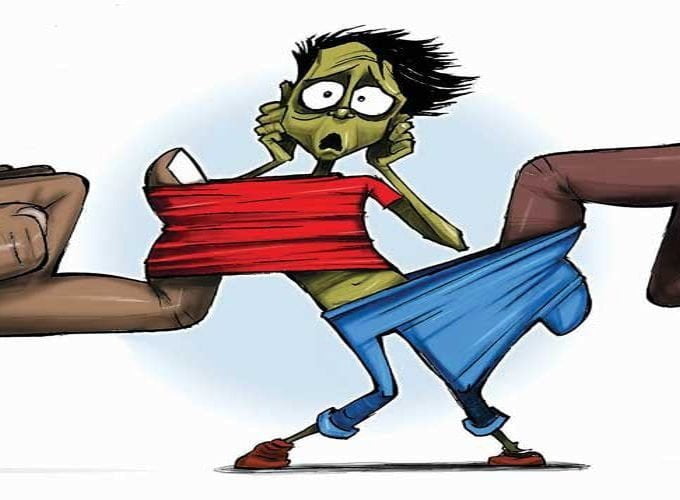Abstract: Domestic violence 2nd degree is a serious crime that can cause physical, emotional, and psychological harm to victims. This blog post aims to provide a comprehensive understanding of domestic violence 2nd degree, including its definition, causes, consequences, and legal implications. Covering all aspects of the topic. The language used is simple and easy to understand, with appropriate scientific terms explained in simple language.
Domestic Violence 2nd Degree
Domestic violence 2nd degree is a criminal offense that involves the use of physical force against a person in a domestic relationship. This blog post aims to provide a comprehensive understanding of domestic violence 2nd degree, including its definition, causes, consequences, and legal implications. The post is structured into ten main headings with three subheadings each.
Definition of Domestic Violence 2nd Degree
Domestic violence 2nd degree is a criminal offense that involves the use of physical force against a person in a domestic relationship. The offense is considered a misdemeanour, and it occurs when a person intentionally or recklessly causes physical harm to another person in a domestic relationship.
Causes of Domestic Violence 2nd Degree
Domestic violence 2nd degree is caused by a range of factors, including:
- Substance abuse: The use of drugs or alcohol can impair judgment and increase the likelihood of violent behavior. Substance abuse can lower inhibitions and lead to poor decision-making, which can result in physical harm to family or household members. Treatment for substance abuse can be an important step in preventing domestic violence.
- Anger issues: Individuals who struggle with managing their anger may resort to violence when they feel frustrated or out of control. Anger management counseling and other forms of therapy can help individuals learn to manage their emotions in healthier ways.
- Learned behavior: Growing up in an abusive household can normalize violence and make it seem like an acceptable way to resolve conflicts. Education and counseling can help break the cycle of violence and prevent it from being passed down to future generations.
- Mental illness: Individuals with mental health issues may be more prone to violent behavior, particularly if their symptoms are untreated. Seeking treatment and support for mental illness can help individuals manage their symptoms and reduce the risk of violence.
- Power and control: Domestic violence can be a way for abusers to maintain power and control over their victims. Abusers may use physical violence, emotional abuse, and other tactics to intimidate and control their partners. Recognizing the signs of domestic violence and seeking help is essential to breaking free from an abusive relationship.
- Economic stress: Financial difficulties can create tension and stress in a household, which can escalate into violence. Seeking financial counseling and support can help alleviate some of the stress and reduce the risk of domestic violence.
- Cultural and societal factors: Beliefs and attitudes about gender roles and relationships can contribute to domestic violence. Challenging traditional gender roles and promoting equality and respect in relationships can help prevent domestic violence.
Consequences of Domestic Violence 2nd Degree
Domestic violence 2nd degree can have serious consequences for both the victim and the perpetrator, including:
- Physical injuries: Domestic violence can cause physical harm to the victim, resulting in bruises, cuts, broken bones, and other injuries that can lead to long-term health problems and disability.
- Emotional trauma: Domestic violence can have lasting emotional effects on the victim, including anxiety, depression, post-traumatic stress disorder, and other mental health issues that can impact their ability to function and enjoy life.
- Financial consequences: Domestic violence can cause the victim to miss work, resulting in lost wages and financial hardship. Medical bills can also pile up as a result of injuries sustained during the abuse.
- Legal consequences: Perpetrators of domestic violence 2nd degree can face serious criminal charges, fines, and jail time. They may also face civil lawsuits and loss of certain rights.
- Relationship problems: Domestic violence can strain relationships and lead to divorce or separation. Victims may also struggle to trust others and form healthy relationships in the future.
- Child custody issues: Domestic violence can impact child custody arrangements in divorce or separation cases, with the court often prioritizing the safety and well-being of the child.
- Stigma and social isolation: Victims of domestic violence may feel stigmatized and socially isolated as a result of the abuse. They may also fear speaking out or seeking help due to societal or cultural attitudes about domestic violence.
Legal Implications of Domestic Violence 2nd Degree
Domestic violence 2nd degree is a criminal offense, and perpetrators can face serious legal consequences, including:
- Arrest and booking: Perpetrators may be immediately arrested and booked in jail after committing domestic violence 2nd degree. They will need to go through the booking process, which includes fingerprinting and taking a mugshot. This can result in a criminal record, which can have long-lasting consequences.
- Protective orders: Victims can obtain protective orders, also known as restraining orders, to keep perpetrators away from them. This is a legal document that prohibits the perpetrator from coming near the victim or their family members. Violating a protective order can result in criminal charges.
- Criminal charges: Perpetrators can be charged with a misdemeanor, which is a criminal offense that carries serious consequences. This can include fines, probation, mandatory counseling, and even jail time. Domestic violence 2nd degree is a less severe offense than domestic violence 1st degree, but still carries serious legal consequences.
- Plea bargaining: Perpetrators may be offered a plea bargain, which is an agreement between the prosecutor and the defendant to reduce charges or a lighter sentence. This is often done to avoid a lengthy and expensive trial. However, victims may not always agree with the plea bargain and feel that the punishment is not sufficient for the crime committed.
- Domestic violence treatment: Perpetrators may be required to undergo domestic violence treatment as part of their sentence. This can include counseling, therapy, and anger management classes. The goal is to address the root causes of domestic violence and prevent it from happening again in the future.
- Civil consequences: Perpetrators can face civil lawsuits, which can result in financial damages. This can include compensatory damages for medical bills and lost wages, as well as punitive damages to punish the perpetrator for their actions.
- Loss of rights: Perpetrators may lose certain rights, such as the right to possess a firearm. This is because domestic violence is considered a violent crime, and the perpetrator may be seen as a danger to society. They may also lose the right to vote, hold public office, or serve on a jury.
Preventing Domestic Violence 2nd Degree
Preventing domestic violence 2nd degree requires a multifaceted approach, including:
- Education: Providing education on healthy relationships, conflict resolution, and the effects of domestic violence is crucial in preventing domestic violence 2nd degree. Education should start at a young age and continue throughout a person’s life, with a focus on building healthy communication skills and promoting respect and equality in relationships.
- Counseling: Counseling and support services are essential for both victims and perpetrators of domestic violence 2nd degree. Victims need access to counseling to help them heal from trauma and develop safety plans. Perpetrators can benefit from counseling and anger management programs to help them address underlying issues and change their behavior.
- Community support: Community involvement is key in preventing and addressing domestic violence 2nd degree. Communities can provide support for victims, hold perpetrators accountable, and promote healthy relationships. Community involvement can take many forms, from volunteering at a domestic violence shelter to participating in community events that raise awareness about domestic violence.
- Legal action: Enforcing laws and policies that address domestic violence 2nd degree is critical in preventing and addressing this issue. Laws and policies should focus on holding perpetrators accountable and providing protection and support for victims. This may include mandatory counseling, protective orders, and criminal prosecution.
- Economic empowerment: Providing economic support and opportunities for victims of domestic violence 2nd degree can help them leave abusive relationships and rebuild their lives. Economic empowerment programs may include job training, financial assistance, and housing support.
- Mental health services: Providing mental health services for individuals who struggle with mental illness and anger management issues can help prevent domestic violence 2nd degree. Mental health services can include counseling, medication management, and support groups.
- Cultural and societal change: Challenging and changing cultural and societal attitudes that contribute to domestic violence 2nd degree is essential. This includes promoting gender equality, challenging toxic masculinity, and combating harmful stereotypes. It also means addressing the root causes of domestic violence, such as power imbalances and social inequalities.
Conclusion
Domestic violence 2nd degree is a serious crime that can cause physical, emotional, and psychological harm to victims. It is caused by a range of factors, including substance abuse, anger issues, learned behavior, mental illness, power and control, economic stress, and cultural and societal factors. The consequences of domestic violence 2nd degree can be severe, including physical injuries, emotional trauma, financial consequences, legal consequences, relationship problems, child custody issues, and social isolation. Preventing domestic violence 2nd degree requires a multifaceted approach, including education, counseling, community support, legal action, economic empowerment, mental health services, and cultural and societal change. It is important to recognize and address domestic violence 2nd degree to ensure the safety and well-being of individuals in domestic relationships.
Last Worded From Author
Thank you for the opportunity to write this blog post on domestic violence 2nd degree. I hope it provides helpful information and raises awareness about the importance of preventing and addressing domestic violence. If you or someone you know is experiencing domestic violence, please seek help and support from local resources and professionals. Remember, domestic violence is never okay, and everyone deserves to feel safe and respected in their relationships.
FAQs
Domestic violence 2nd degree is a criminal offense that involves intentionally causing physical harm or injury to a family or household member. It is considered a less severe offense than domestic violence 1st degree, but still carries serious consequences.
There are many factors that can contribute to domestic violence 2nd degree, including substance abuse, anger issues, learned behavior, mental illness, power and control, economic stress, and cultural and societal factors.
Signs of domestic violence 2nd degree can include physical injuries, emotional trauma, isolation from friends and family, controlling behavior, and fear of the perpetrator.
The legal consequences of domestic violence 2nd degree can include fines, probation, mandatory counseling, protective orders, and even jail time. Perpetrators may also face civil lawsuits and loss of certain rights, such as the right to possess a firearm.
Preventing domestic violence 2nd degree requires a multifaceted approach, including education, counseling, community support, legal action, economic empowerment, mental health services, and cultural and societal change.
If someone is experiencing domestic violence 2nd degree, it is important to seek help and support from local resources and professionals. This may include contacting a domestic violence hotline, seeking medical attention, filing a police report, obtaining a protective order, and getting counseling and support services.
References
- National Domestic Violence Hotline. (n.d.). Get help. Retrieved from https://www.thehotline.org/get-help/
- National Institute of Mental Health. (2019). Post-traumatic stress disorder. Retrieved from https://www.nimh.nih.gov/health/topics/post-traumatic-stress-disorder-ptsd/index.shtml
- U.S. Department of Justice. (n.d.). Domestic violence. Retrieved from https://www.justice.gov/ovw/domestic-violence
Also Read







